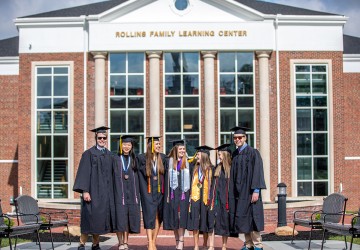When you picture a college-educated individual, what type of degree do you imagine? In all likelihood, the bachelor's comes to mind. The prominence of this option in modern society is underscored by the United States Census Bureau data, which reveals that 36 percent of adults age 25 and older possess a bachelor's. Many others, however, have certificates, associate degrees, or graduate-level credentials.
With so many options available, the process of selecting an academic trajectory can feel overwhelming. It's no wonder so many students question: What degrees should I get?
Even if you have an idea of your desired area of study, you may not know which level of education is preferable or, simply put, worth it. You'll find it far easier to plan if you understand the full range of post-secondary degree programs, which we've highlighted below:
CERTIFICATES
What Is It?
An academic certificate consists of a document that verifies that a student has successfully completed a specific series of courses or passed various tests. These programs encourage students to gain specialized training, often with the goal of becoming better qualified in their chosen career field.
Earning a Certificate
Certificate programs vary but can often be completed in less than a year. This makes them a wonderful option for students who need a resume boost but are unable to commit to more expensive or time-intensive options such as master's or doctorate degrees. Certificates for aspiring education administrators, for example, involve three terms lasting eight weeks each.
Common Types of Certificates
Certificates are available in a variety of subjects. They are available at several levels, with some maintaining extensive requirements for admission and others open to most students. Many involve the education profession and must be earned for teachers to improve pay and other benefits. Common types of certificate programs include:
- Rank I teaching certificate
- Education administration certification
- Proficiency evaluation program
ASSOCIATE DEGREES
What Is It?
Sometimes referred to as the "two-year degree," the associate degree provides a base level of knowledge for students who have completed high school. It can be earned alone or as a step on the way to obtaining a bachelor's.
Earning an Associate Degree
While full-time students are often able to earn associate degrees in two years or less, many prefer to take an extended, part-time approach that allows them greater flexibility for handling work and family demands.
Often, credits earned in the pursuit of an associate degree can be applied to a bachelor's. As such, associate's programs appeal greatly to working students in need of a quick boost in job status or pay—but are also interested in continuing on to obtain the additional benefits available at the bachelor's level. The associate also represents one of the most affordable degree options.
Examples of Associate Degrees
Associate degrees are far more diverse than most students realize. Like bachelor's degrees, they are offered within multiple categories:
- Associate of Arts. Built to include a variety of courses in the arts, humanities, and social sciences, the A.A. serves as the associate-level version of the better-known Bachelor of Arts.
- Associate of Science. Core math and science classes form the basis of this program, which also incorporates several targeted classes in a specific subject. It can be thought of as a shorter version of the Bachelor of Science.
- Associate of Applied Science. Designed to get students equipped with skills they can apply in the workforce, the A.A.S. emphasizes career readiness above all else.
BACHELOR’S DEGREES
What Is It?
Picture a 'traditional' college experience involving four years of study followed by swift entry into the workforce. This is a common iteration of the bachelor's degree, which is designed to provide both a comprehensive understanding of important subjects and a deep dive into a specific area of interest.
A 'typical' bachelor's degree involves the following elements:
- A major, involving core courses, electives, and often, practical applications via capstones, internships, or student teaching.
- A minor, which requires fewer credits and obligations but still provides a thorough overview of a subject of interest.
- General education classes. These are more prominent within liberal arts degrees which aim to provide students with a broad base of knowledge and important skills such as written communication and problem solving.
Earning a Bachelor's Degree
While societal expectations suggest that every bachelor's degree will be completed within four years, reality looks a bit different. Many students take longer due to time-intensive internships or student-teaching placements. Others take gap years or spend time studying abroad. Still others prefer to attend on a part-time basis so they can continue to work or fulfill family obligations. All these arrangements are available and encouraged.
The cost of a bachelor's degree may depend on how long it takes to complete and whether financial aid is available.
Examples of Bachelor's Degrees
As one of the most versatile types of academic credentials, the bachelor's degree spans a myriad of topics and professional pursuits. It can be divided into several categories, including:
- Bachelor of Arts. Students seeking expansive knowledge in language, literature, and other topics may prefer the Bachelor of Arts. This comprehensive approach may be preferable for students seeking diverse, easily transferable skills. Examples include a B.A. in Christian Ministries or the enduringly popular B.A. in Psychology.
- Bachelor of Science. As its name implies, the Bachelor of Science emphasizes courses in math and science over those involving humanities and arts. They also focus more on the specific area of study than similar B.A. programs. These degrees are surprisingly diverse, however. In addition to top options such as the B.S. in Chemistry or B.S. in Accounting, targeted degrees such as a Bachelor of Science with a Major in Art are also available.
- Bachelor of Applied Science. A heavily career-oriented approach, the Bachelor of Applied Science is often sought by students who have already obtained a corresponding associate degree. These programs emphasize practical skills that can be applied in the workplace. Favorites include the B.A.S. in Allied Health and the B.A.S. in Human Services.
MASTER’S DEGREES
What Is It?
An advanced degree, the master's is likely what you think of when you picture graduate school. Earning this degree demonstrates that you've mastered the subject in question.
Earning a Master's Degree
Master's degrees are highly focused, as they aim to prepare students for swift entry into specific careers, often at a mid or upper level. These programs are designed for students who have already built a core base of knowledge at the bachelor's level.
Classes are collaborative and engaging, but also highly challenging. These programs tend to cost more per credit than their undergraduate counterparts, but they also can produce significant improvements in salary and general career potential.
Examples of Master's Degrees
Master's programs tend to be more focused than their counterparts at the bachelor's level. These are often pursued by students with specific visions for their professional future. Examples include:
- Master's in Health and Human Performance
- Master's in Christian Studies
- Master's in Education
- Master's in Information Systems Security
Another option is the Executive Master's, which is largely designed for mid-career professionals who intend to continue working as they pursue graduate-level education. These individuals can benefit from earning everything from an Executive Master's in Project Management to an Executive Master's in Digital Forensics.
DOCTORATE DEGREES
What Is It?
A step above the master's degree, the doctorate confers a level of expertise required for upper-level fields in management and research. Doctorates are also typically terminal degrees, meaning there is no higher program to pursue in this area. These programs emphasize analytical and written abilities above and beyond the practical skills often cultivated when pursuing a master's degree.
Earning a Doctorate
As the most research-intensive degree, the doctorate requires years of hard work and sacrifice. To thrive, students must be genuinely passionate about the subject matter. Tuition may exceed that of master's degrees, but many students are willing to put up with the extra work and expense for the possibility of earning over six figures—or exerting more influence within their career field of choice.
Examples of Doctorate Degrees
Doctorate degrees are not quite as versatile as academic programs offered at lower levels, but there are still plenty of options available for students who possess a clear passion in and aptitude for specific areas of research. These degrees are typically divided into one of two main categories:
- Doctorate. The basic doctorate degree supersedes a master's in terms of research but still strives to apply newfound knowledge in practical settings. Examples include the Doctor of Business Administration and the Doctorate in Educational Leadership.
- Doctorate of Philosophy. Widely referred to as the Ph.D., the Doctorate of Philosophy primarily focuses on theoretical matters. Students may emphasize academic knowledge over practical application. Many seek this degree in hopes of pursuing upper-level research or even one day working as professors at elite universities.
- As with master's degrees, doctorates can take on an executive form, with working professionals often opting for programs such as the Executive Doctorate of Philosophy in Information Technology or the Executive Ph.D. in Leadership.
PROFESSIONAL DEGREES
What Is It?
As its name implies, the professional degree prepares students to succeed within specific professions. While this can technically be said of the many programs mentioned above, the professional degree takes on an extra element of focus.
Earning a Professional Degree
Professional degree programs often list their credentials as B.S. in a related topic, but with the addition of the job fields students hope to obtain. For example, a Pre-Dentistry program could involve earning a Bachelor of Science in Biology with a Pre-Professional Emphasis.
In addition to standard classes that would be incorporated within that B.S., students are strongly encouraged to take career-oriented electives. Costs for the entire program tend to be similar to those required for standard bachelor's degrees.
Examples of Professional Degree Programs
Professional degrees typically reference specific fields and include "pre" somewhere within the title. Pre-Medicine and Pre-Pharmacy are well-known tracks, but students can also prepare for the future with degrees such as Pre-Law, Pre-Engineering, and Pre-Seminary.
What Degree Should I Get? Choosing the Right Program
A variety of factors may influence your preferred degree program. First, you'll need to determine your existing credentials, as many competitive programs involve extensive prerequisites. Cost is also worth considering, as tuition can vary dramatically based on the level of study. Don't forget future earning potential, which improves significantly as you rise through the ranks.
If you are interested in learning more about undergraduate degrees and graduate degrees offered at University of the Cumberlands, contact an admissions counselor or request more information today.

